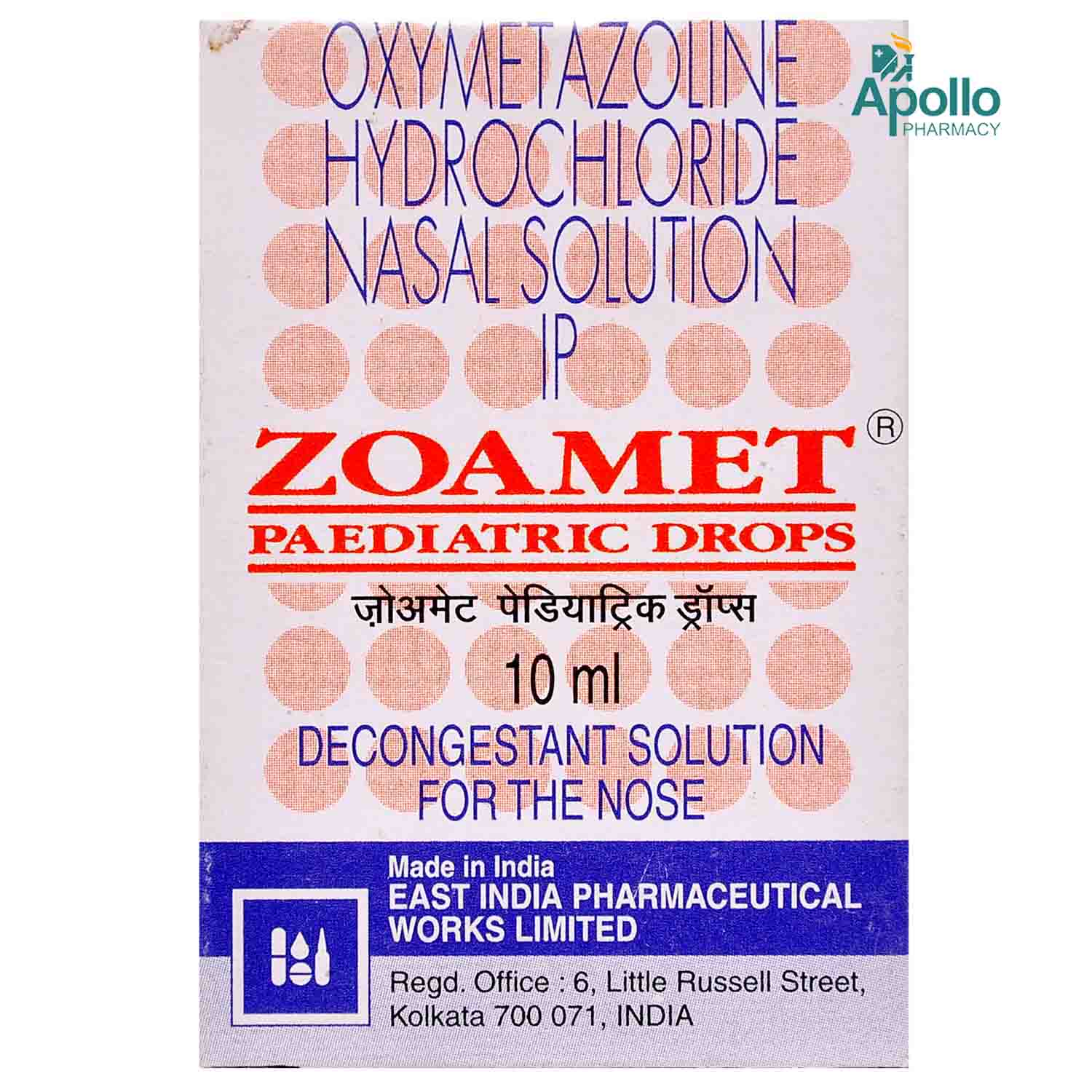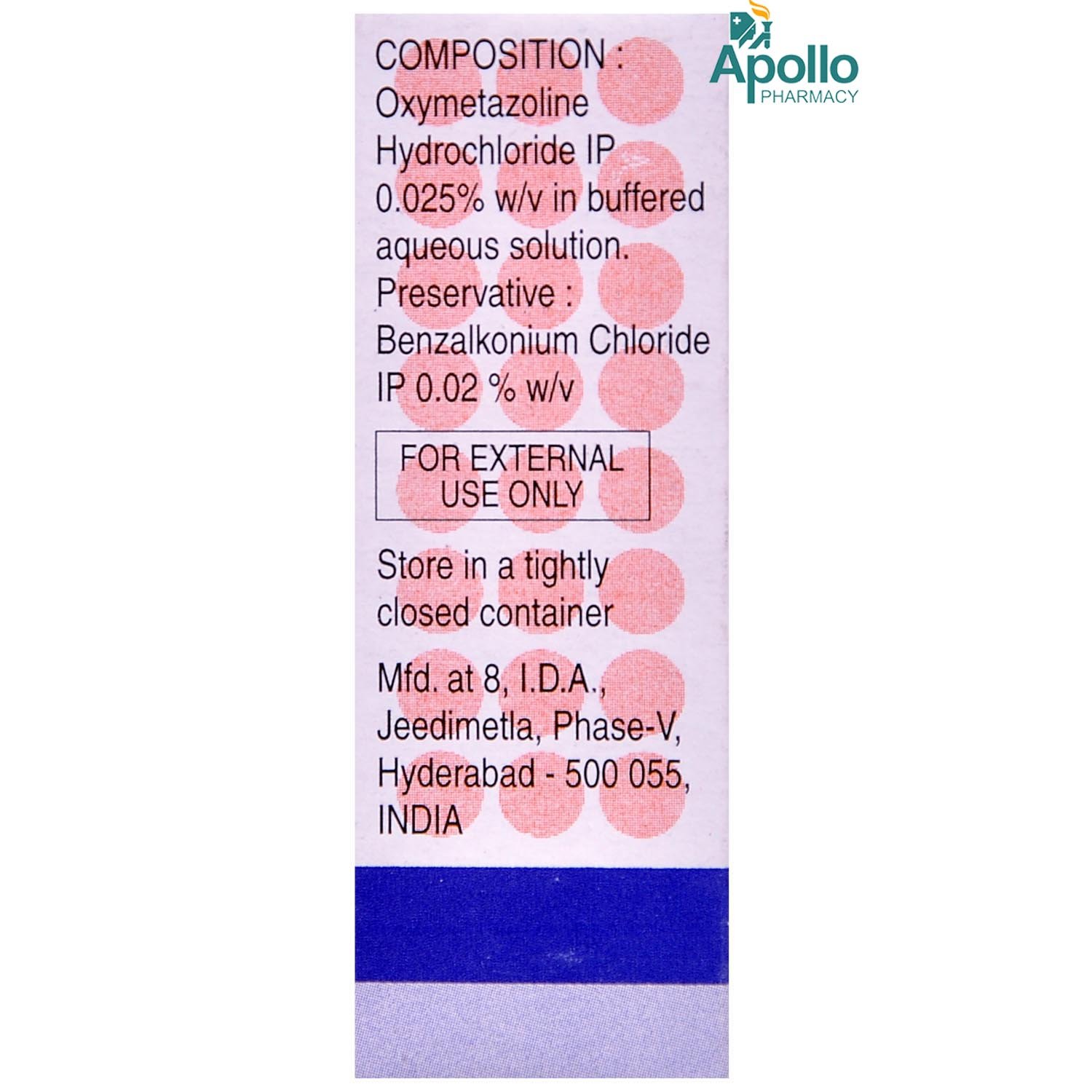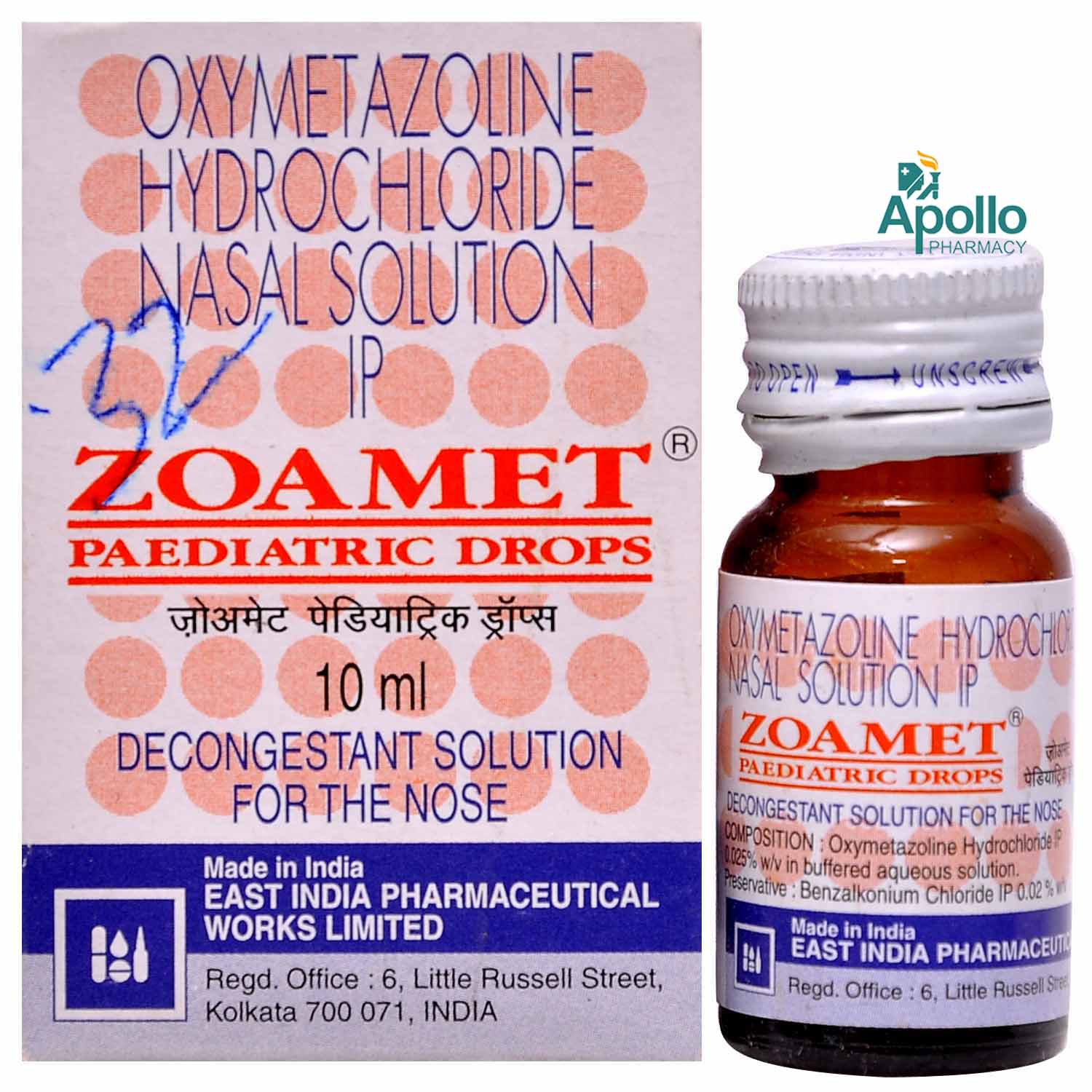Zoamet Paediatric Nasal Drops 10 ml
MRP ₹67.5
(Inclusive of all Taxes)
₹10.1 Cashback (15%)
About Zoamet Paediatric Nasal Drops
Zoamet Paediatric Nasal Drops belongs to the class of medications called nasal decongestants primarily used to treat nasal congestion (stuffy nose) caused by hay fever (allergic rhinitis), common colds, flu, sinusitis, or other allergic sinusitis. Nasal congestion also known as stuffy nose occurs when nasal passages become swollen with excess mucus and fluid.
Zoamet Paediatric Nasal Drops contains Oxymetazoline, a nasal decongestant that works by contracting and narrowing the blood vessels in the linings of nasal passages. Thus, Zoamet Paediatric Nasal Drops provides relief from congestion and decreases mucus production.
Use Zoamet Paediatric Nasal Drops as prescribed by your doctor. You are advised to use Zoamet Paediatric Nasal Drops for as long as your doctor has prescribed it based on your medical condition. Some people may experience irritation or dryness of the nasal mucosa (tissue lining the nasal cavity), local burning sensation, headache, and nausea. Most of these side effects of Zoamet Paediatric Nasal Drops do not require medical attention and gradually resolve over time. However, if the side effects persist or worsen, please consult your doctor.
Please tell your doctor if you are allergic to Zoamet Paediatric Nasal Drops or any other medicines. If you are pregnant or breastfeeding, inform your doctor before using Zoamet Paediatric Nasal Drops. Oxymetazoline nasal drops can be safely used in children. Avoid taking Zoamet Paediatric Nasal Drops if you have narrow-angle glaucoma or if you have undergone recent trans-nasal surgery. If you have diabetes, high blood pressure, hyperthyroidism, or heart disease, inform your doctor before taking Zoamet Paediatric Nasal Drops. You are recommended to remove nasal fluids before applying Zoamet Paediatric Nasal Drops by blowing the nose. Avoid sharing Zoamet Paediatric Nasal Drops with other people to prevent the spread of infection.
Country of origin
Manufacturer/Marketer address
Online payment accepted

secured payment

india's most trusted pharmacy

genuine products
Composition :
Manufacturer/Marketer :
Consume Type :
Expires on or after :
Return Policy :
NPPA :
Provide Delivery Location
About Zoamet Paediatric Nasal Drops
Zoamet Paediatric Nasal Drops belongs to the class of medications called nasal decongestants primarily used to treat nasal congestion (stuffy nose) caused by hay fever (allergic rhinitis), common colds, flu, sinusitis, or other allergic sinusitis. Nasal congestion also known as stuffy nose occurs when nasal passages become swollen with excess mucus and fluid.
Zoamet Paediatric Nasal Drops contains Oxymetazoline, a nasal decongestant that works by contracting and narrowing the blood vessels in the linings of nasal passages. Thus, Zoamet Paediatric Nasal Drops provides relief from congestion and decreases mucus production.
Use Zoamet Paediatric Nasal Drops as prescribed by your doctor. You are advised to use Zoamet Paediatric Nasal Drops for as long as your doctor has prescribed it based on your medical condition. Some people may experience irritation or dryness of the nasal mucosa (tissue lining the nasal cavity), local burning sensation, headache, and nausea. Most of these side effects of Zoamet Paediatric Nasal Drops do not require medical attention and gradually resolve over time. However, if the side effects persist or worsen, please consult your doctor.
Please tell your doctor if you are allergic to Zoamet Paediatric Nasal Drops or any other medicines. If you are pregnant or breastfeeding, inform your doctor before using Zoamet Paediatric Nasal Drops. Oxymetazoline nasal drops can be safely used in children. Avoid taking Zoamet Paediatric Nasal Drops if you have narrow-angle glaucoma or if you have undergone recent trans-nasal surgery. If you have diabetes, high blood pressure, hyperthyroidism, or heart disease, inform your doctor before taking Zoamet Paediatric Nasal Drops. You are recommended to remove nasal fluids before applying Zoamet Paediatric Nasal Drops by blowing the nose. Avoid sharing Zoamet Paediatric Nasal Drops with other people to prevent the spread of infection.
Uses of Zoamet Paediatric Nasal Drops
Key Benefits
Zoamet Paediatric Nasal Drops contains Oxymetazoline, a nasal decongestant that contracts and narrows the blood vessels in the linings of nasal passages. Thus Zoamet Paediatric Nasal Drops, clears the blocked nose and decreases mucus production.
Directions for Use
Storage
Side Effects of Zoamet Paediatric Nasal Drops
- Irritation or dryness of the nasal mucosa (tissue lining nasal cavity)
- Local burning sensation
- Headache
- Nausea
Drug Warnings
Please tell your doctor if you are allergic to Zoamet Paediatric Nasal Drops or any other medicines. If you are pregnant or breastfeeding, inform your doctor before using Zoamet Paediatric Nasal Drops. Avoid taking Zoamet Paediatric Nasal Drops if you have narrow-angle glaucoma or if you have undergone recent trans-nasal surgery. If you have diabetes, high blood pressure, hyperthyroidism or heart disease, inform your doctor before taking Zoamet Paediatric Nasal Drops. You are recommended to remove nasal fluids before applying Zoamet Paediatric Nasal Drops by blowing the nose. Avoid sharing Zoamet Paediatric Nasal Drops with other people to prevent the spread of infection. Oxymetazoline nasal drops can be safely used in children.
Drug Interactions
Drug-Drug Interaction: Zoamet Paediatric Nasal Drops may interact with antidepressants (imipramine, desipramine, nortriptyline, doxepin, clomipramine, amitriptyline), ergot alkaloids (ergonovine, dihydroergotamine, ergotamine, methylergonovine) and MAO inhibitors (linezolid, isocarboxazid, rasagiline, phenelzine, selegiline, tranylcypromine).
Drug-Food Interaction: Zoamet Paediatric Nasal Drops may interact with caffeine. Therefore, avoid or limit the intake of caffeine (chocolate, tea, coffee, colas and some herbal supplements), with Zoamet Paediatric Nasal Drops, as it may increase the risk of adverse effects such as sleep problems, rapid heartbeat, nervousness, nausea or tremor.
Drug-Disease Interaction: If you have diabetes, high blood pressure, hyperthyroidism, enlarged prostate gland, narrow-angle glaucoma or heart disease, inform your doctor before taking Zoamet Paediatric Nasal Drops.
Drug-Drug Interactions Checker List
- IMIPRAMINE
- DESIPRAMINE
- NORTRIPTYLINE
- DOXEPIN
- CLOMIPRAMINE
- AMITRIPTYLINE
- ERGONOVINE
- DIHYDROERGOTAMINE
- ERGOTAMINE
- METHYLERGONOVINE
- LINEZOLID
- ISOCARBOXAZID
- RASAGILINE
- PHENELZINE
- SELEGILINE
- TRANYLCYPROMINE
Habit Forming
Diet & Lifestyle Advise
- Add ginger to foods or tea as it contains some anti-inflammatory compounds that can relax membranes in the airways and reduce cough, irritation and swelling in nasal passages.
- Staying hydrated is vital for those with a cough or cold. Drink liquids at room temperature to get relief from runny nose, cough, and sneezing.
- The immune system is affected by stress and raises the risk of being sick. Do meditation, deep breathing, regular exercise and try progressive muscle relaxation techniques to get relief from stress.
- It is advised to avoid contact with known allergens (allergy-causing agents) such as pollen, dust, etc. Certain food items are known to cause allergies to you.
- Maintain personal hygiene and keep your surroundings clean.
Special Advise
Please consult a doctor if the condition persists or worsens after using Zoamet Paediatric Nasal Drops for 3 days.
Disease/Condition Glossary
Nasal congestion: It is also known as stuffy nose that occurs when nasal passages become swollen with excess mucus and fluid. Nasal congestion may be caused by hay fever, allergies, nasal polyps (non-cancerous growths) or benign tumours in the nasal passages, environmental irritants or a long lasting sinus infection. It may also be triggered by tobacco smoke, perfume or an infection. Rinsing the inside of the nose with saline solution and using a humidifier at home may help to provide relief from congestion. Consult a doctor if you have severe nasal discharge, fever, sinus pain, or difficulty breathing.
FAQs
Disclaimer
Alcohol
Safe if prescribed
The interaction of Zoamet Paediatric Nasal Drops with alcohol is unknown. Please consult your doctor if you have any concerns.
Pregnancy
Consult your doctor
If you are pregnant, use Zoamet Paediatric Nasal Drops only if prescribed by your doctor.
Breast Feeding
Consult your doctor
If you are a breastfeeding mother, use Zoamet Paediatric Nasal Drops only if prescribed by your doctor.
Driving
Safe if prescribed
Zoamet Paediatric Nasal Drops does not affect your ability to drive or operate machinery.
Liver
Consult your doctor
If you have liver problems, consult your doctor before using Zoamet Paediatric Nasal Drops.
Kidney
Consult your doctor
If you have kidney problems, consult your doctor before using Zoamet Paediatric Nasal Drops.
Children
Safe if prescribed
Nasal drops can be used in children. However, please consult your doctor if you have any concerns.
Author Details
We provide you with authentic, trustworthy and relevant information
Uses of Zoamet Paediatric Nasal Drops
Key Benefits
Zoamet Paediatric Nasal Drops contains Oxymetazoline, a nasal decongestant that contracts and narrows the blood vessels in the linings of nasal passages. Thus Zoamet Paediatric Nasal Drops, clears the blocked nose and decreases mucus production.
Directions for Use
Storage
Drug Warnings
Please tell your doctor if you are allergic to Zoamet Paediatric Nasal Drops or any other medicines. If you are pregnant or breastfeeding, inform your doctor before using Zoamet Paediatric Nasal Drops. Avoid taking Zoamet Paediatric Nasal Drops if you have narrow-angle glaucoma or if you have undergone recent trans-nasal surgery. If you have diabetes, high blood pressure, hyperthyroidism or heart disease, inform your doctor before taking Zoamet Paediatric Nasal Drops. You are recommended to remove nasal fluids before applying Zoamet Paediatric Nasal Drops by blowing the nose. Avoid sharing Zoamet Paediatric Nasal Drops with other people to prevent the spread of infection. Oxymetazoline nasal drops can be safely used in children.
Therapeutic Class
Drug-Drug Interactions
Drug-Drug Interactions
Login/Sign Up
Drug-Drug Interactions Checker List
- IMIPRAMINE
- DESIPRAMINE
- NORTRIPTYLINE
- DOXEPIN
- CLOMIPRAMINE
- AMITRIPTYLINE
- ERGONOVINE
- DIHYDROERGOTAMINE
- ERGOTAMINE
- METHYLERGONOVINE
- LINEZOLID
- ISOCARBOXAZID
- RASAGILINE
- PHENELZINE
- SELEGILINE
- TRANYLCYPROMINE
Diet & Lifestyle Advise
- Add ginger to foods or tea as it contains some anti-inflammatory compounds that can relax membranes in the airways and reduce cough, irritation and swelling in nasal passages.
- Staying hydrated is vital for those with a cough or cold. Drink liquids at room temperature to get relief from runny nose, cough, and sneezing.
- The immune system is affected by stress and raises the risk of being sick. Do meditation, deep breathing, regular exercise and try progressive muscle relaxation techniques to get relief from stress.
- It is advised to avoid contact with known allergens (allergy-causing agents) such as pollen, dust, etc. Certain food items are known to cause allergies to you.
- Maintain personal hygiene and keep your surroundings clean.
Habit Forming
Side Effects of Zoamet Paediatric Nasal Drops
- Irritation or dryness of the nasal mucosa (tissue lining nasal cavity)
- Local burning sensation
- Headache
- Nausea
Special Advise
Please consult a doctor if the condition persists or worsens after using Zoamet Paediatric Nasal Drops for 3 days.
Disease/Condition Glossary
Nasal congestion: It is also known as stuffy nose that occurs when nasal passages become swollen with excess mucus and fluid. Nasal congestion may be caused by hay fever, allergies, nasal polyps (non-cancerous growths) or benign tumours in the nasal passages, environmental irritants or a long lasting sinus infection. It may also be triggered by tobacco smoke, perfume or an infection. Rinsing the inside of the nose with saline solution and using a humidifier at home may help to provide relief from congestion. Consult a doctor if you have severe nasal discharge, fever, sinus pain, or difficulty breathing.
All Substitutes & Brand Comparisons
RX
Out of StockOxyinoz Paed 0.025% Nasal Drops
₹44
(₹3.96/ 1ml)
34% CHEAPERRX
Out of StockMedinoze Junior 0.025% Nasal Drops
Mdc Pharmaceuticals Pvt Ltd
₹54
(₹4.86/ 1ml)
20% CHEAPER

Have a query?




















